Little-known battle of the Patriotic War 1812 of the year: the battle of Klyastitsy
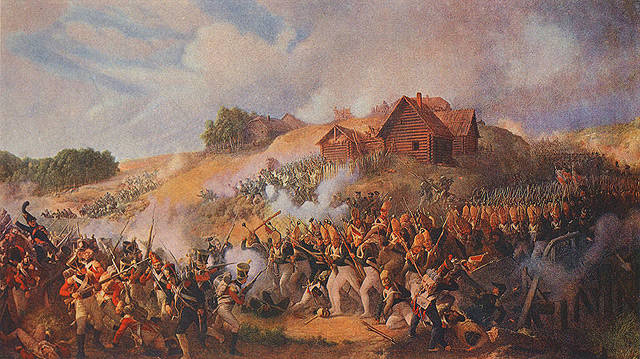
One of the little-known battles of World War 1812, was the battle of Klyastitsy. In this 3-day battle, Russian troops under the command of Lieutenant-General Peter Christian Wittgenstein defeated the superior French forces of Marshal Oudinot and stopped the advance of the enemy to the capital of the empire, St. Petersburg. It was the first major victory of the Russian army in the 1812 war of the year.
If the actions of the "Great Army" of Napoleon in the Moscow direction are quite well covered, even in the school year stories, then other directions can be found only on the map of the Patriotic War 1812 of the year. Two separate corps were sent to the north of the Russian Empire: the 1 of the marshal Oudinot, the 2 of the marshal of MacDonald. The Udino Corps (numbering 28, thousand people) was to conduct operations in the direction of the capital of Russia. The Prussian-French Macdonald Corps (numbering up to 30 thousand soldiers) had the task of attacking the Riga direction, possibly occupying Riga, and then contributing to the Udino corps. In addition, these corps were supposed to establish regular deliveries to the main army of food and fodder.
They were opposed by the 1 Infantry Corps of Lieutenant General Peter Hristianovich Wittgenstein. With the withdrawal of the Russian army from the camp at Drisshoi on P.Kh. Wittgenstein, who had thousands of soldiers under the command of 20, was given the task of covering the path to St. Petersburg. In addition to this corps, the Riga Governor-General of Essen had up to 18 thousands of soldiers to organize the defense of Riga. 1 Infantry Corps P.H. Wittgenstein, being weaker than either of the two opposing French corps, would not have been able to withstand the blow of their combined forces. But Wittgenstein got a chance to win, as the enemy marshals acted separately.
In addition, the French forces interfered with a water barrier - the Western Dvina River. Marshal MacDonald singled out a part of the troops for the blockade of Riga, with the rest he remained in Jacobstadt in order to build bridges across the West Dvina and cross his forces to the right bank. MacDonald planned to go to the rear of Wittgenstein’s corps, to unite in Ustineko with the forces of Udino on the Pskov road. This would completely cut off the Russian troops from Pskov, which was the rear base of the Vitgnstein corps, and then defeat them. Marshal Oudinot tried to cross the Western Dvina in Dinaburg, but he could not break the resistance of the garrison. Therefore, he climbed up the river and crossed the Dvina River near Polotsk.
General P.H. Wittgenstein was in a difficult situation, his only chance to turn the tide in his favor, to stop the French was the attack of Oudinot and the victory over his forces. This had to be done, despite the superiority of the enemy forces, taking advantage of the remoteness of the MacDonald's corps.
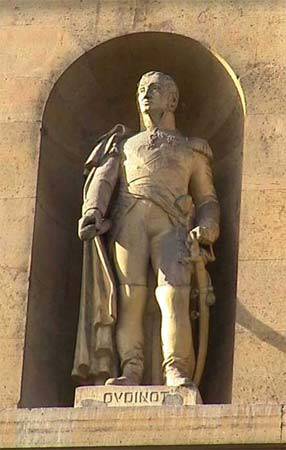
Monument to Oudinot in the niche of the Louvre.
Battle
16 (28) July 1812, the 3 French Cavalry Regiment (12 Squadrons) were caught unawares and attacked by 4 Squadrons of the Grodno Hussars Regiment under the command of general-general Yakov Petrovich of the Grodno Hussar Regiment under the command of Major-General Yakov Petrovich of the Gdruk Regiment under the command of the Major-General Yakov Petrovich of the Grodno Hussar Regiment under the command of the major major Yakov Petrovich, under the order of the day, the phone-to-on-line mode also used the current settings, in the case, the settings were also used for the subunits, and the subunits, in the case, the settings were also used to be used for the subunits, they also to see the current; Despite their superiority, the French cavalry was overturned.
It should be noted that Kulnev became a real hero of that war. From the very beginning, it showed itself perfectly: the very first days of the war, Kulnev 8 defended Vilkomir for hours, allowing the main Russian forces to retreat in an organized manner, and retreated, burning the bridge behind them. At the beginning of July, 1812, he crossed over with two cavalry regiments and an artillery company across the Dvina, in order to carry out reconnaissance, was able to catch two French regiments unawares, defeated them. In this fight before the 300, the French were injured and killed, 200 were captured, among them General de Saint-Genier. On July 13, he defeated several more French troops, more than 400 people were captured, the Russian command from the prisoners learned that the French were planning to go to Sebezh. In total for the 2 week of fighting, from 3 to 17 in July 1812, the Grodno Hussars captured up to 2 thousands of people.
He distinguished himself in the battle of Klyastitsy, but this battle was his last, he was fatally wounded. Y.P. Kulnev was considered one of the best commanders of the avant-garde and rearguard. Receiving a report about his death, Napoleon Bonaparte wrote to Josephine: "Kulnev, the best Russian cavalry officer, was killed yesterday." He was an officer of the Suvorov school: strict with himself and his subordinates, the soldiers loved him for his fatherly care for them. He conscientiously cared about quality supplies and clothing for people, followed the competent organization of transitions and camps. He treated with contempt those people who had gained personal benefit from the position of commander. Having made a decision, Kulnev acted decisively and quickly. He had a special charisma ("Suvorov"). In everyday life he lived in Spartan, he was content with a small one, his salary was sent to relatives.
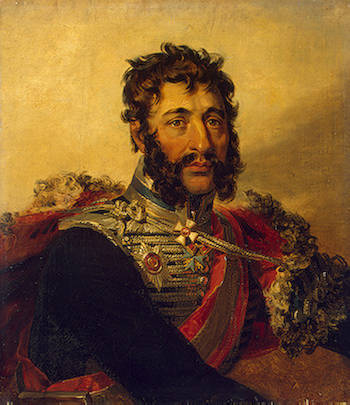
Yakov Petrovich Kulnev. Russian commander, hero of World War 1812 of the year.
Marshal Oudinot occupied the village of Klyastitsy (on the road between Polotsk and Sebezh), having under his command 28 thousands of soldiers and 114 guns against Russian 17 thousands of soldiers. But General P.Kh. Wittgenstein decided to attack the enemy, taking advantage of the length of the French corps. The advance guard of Major General Kulnev (3700 cavalrymen and 12 guns) moved ahead, followed by the main forces of the Russian corps (13 thousand soldiers, 72 guns).
18 (30) July, at 2 one o'clock in the afternoon, Russian advanced forces under the command of Kulnev faced the French avant-garde near the village of Yakubovo. A fierce head-on battle was going on until the end of the day. As a result, Kulnev failed to dislodge the French from the village.
19 (31) July, the battle began at 3 in the morning, the main Russian forces entered the battle, and after several fights for Yakubovo, they managed to capture him. Udine began to divert his forces to Klyastitsam. In 7 hours of the morning, Russian troops were able to reach the river Nishcha, sitting against the enemy positions. The only bridge at Klyastits was under shelling of French artillery. P.H. Wittgenstein ordered Kulnev with his forces and reinforcements (the Yamburg Dragoon Regiment) to descend the river below and strike French forces from the right flank. Marshal Oudinot, deciding that Klyastitsy could no longer hold him, ordered the bridge to be burned and ready to leave. The 2 Battalion of the Pavlovsky Grenadier Regiment broke through the burning bridge to the other side, at the same time the Grodno Hussars and the Yamburg Dragoons crossed the river ford. This moment was later depicted on the canvas by Peter Hess “Battle at Klyastitsy” (currently the picture is in the State Hermitage Museum, in the Picket Hall, which is dedicated to the Patriotic War 1812 of the Year).
The French moved away from Klyastits, and it was decided to pursue them. This detachment under the command of Kulnev included: the Grodno Hussars, the Yamburg Dragoons, two squadrons of the Riga Dragoons, Don Cossacks, as well as equestrian artillery companies and the 1 infantry battalion. The Kulnev squadron of 20 on July 1812 of the year crossed the Drissa River and headed for the village of Boyarshchina. The general received an order to pursue the enemy cautiously, but carried away. At the village of Boyarshchina the Russian forces were caught in a French ambush, especially great damage was inflicted by the skillfully placed enemy artillery, which fired from the dominant heights. It was in this battle that Major General Yakov Petrovich Kulnev received a mortal wound.
In turn, in pursuit of the retreating Russian avant-garde, the French general Verdier ran into Golovchitsa at the main forces of Wittgenstein’s corps and was defeated. In this battle, Wittgenstein was wounded in the cheek.
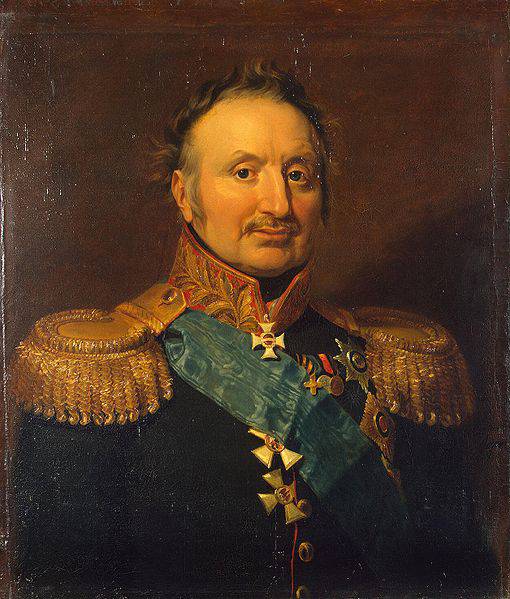
Peter Christianity Vietgenstein. In World War 1812 - the commander of a separate corps in the St. Petersburg direction.
Battle results
Corps Marshal Oudinot retreated over the Western Dvina, thus the French offensive of the French against the capital of the Russian Empire failed. In addition, fearing the actions of the corps of Wittgenstein on the supply lines of the main army, which operated on the Moscow direction, the French emperor was forced to weaken his main grouping of troops, sending the 6 corps (Bavarian) of General Saint-Cyr to support the broken Udino corps. The Wittgenstein corps retained its combat capability until the end of the war, but failed to crush it.
General P.Kh. Wittgenstein in his report to Emperor Alexander I reported on 3 thousands of prisoners, and he estimated the number of killed and wounded enemies (according to the words of the captured French) in 10 thousands. Nowadays, the figure in 5,5 of thousands of killed and wounded French and about 4 of thousands of Russians is recognized.
It was the first major Russian victory in the 1812 war of the year, and it greatly raised the authority of General Wittgenstein, so, after the death of M.I. At the end of April 1813, Kutuzov was the one Wittgenstein was appointed commander-in-chief of the Russian and Prussian forces. This victory raised the spirit of Russian society. Lieutenant General was awarded the Order of St. George 2-th degree. The Russian emperor called him the savior of the capital. From the citizens of P.H., Wittgenstein received the honorary title of “Defender of Petrov Grad”, which was first heard in the song, which ended with the following words:
Praise, praise you, hero!
What hail Petrov saved you!
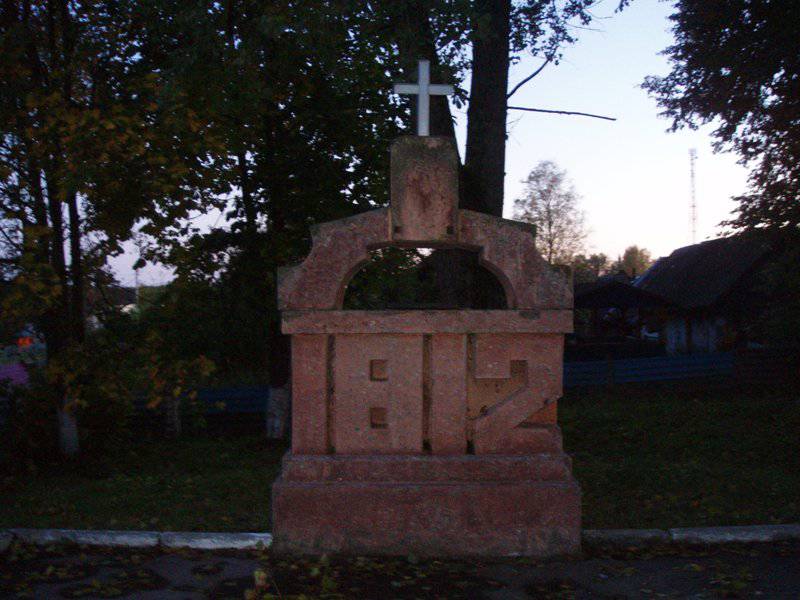
Memorial sign in honor of the 1812 events of the year in the center of Klyastits.
Information